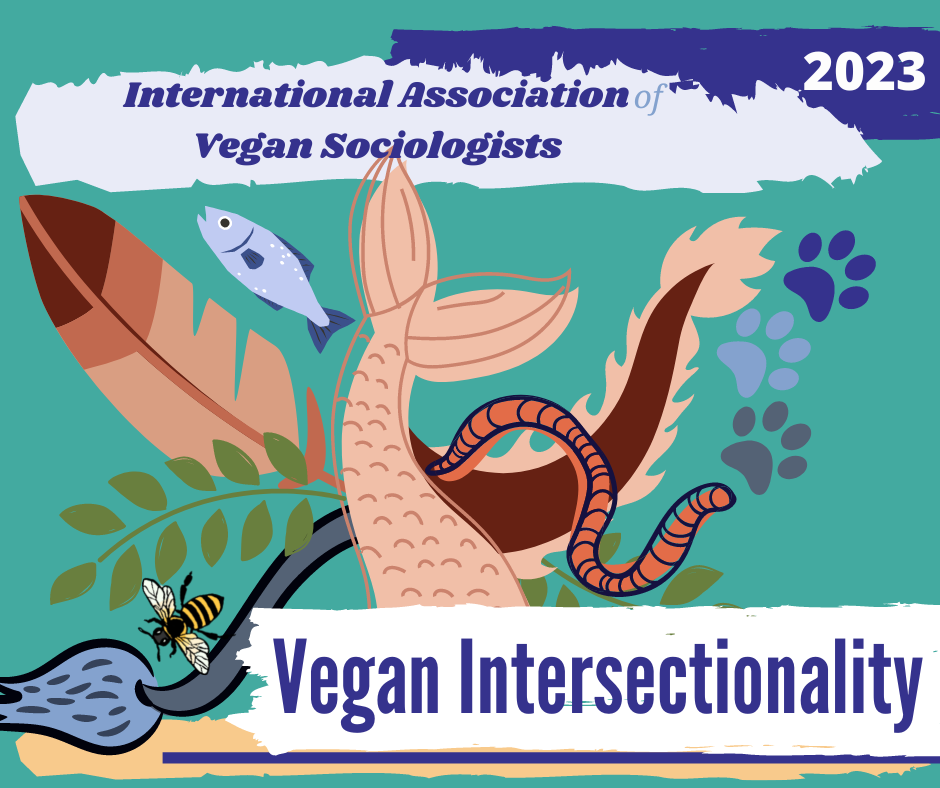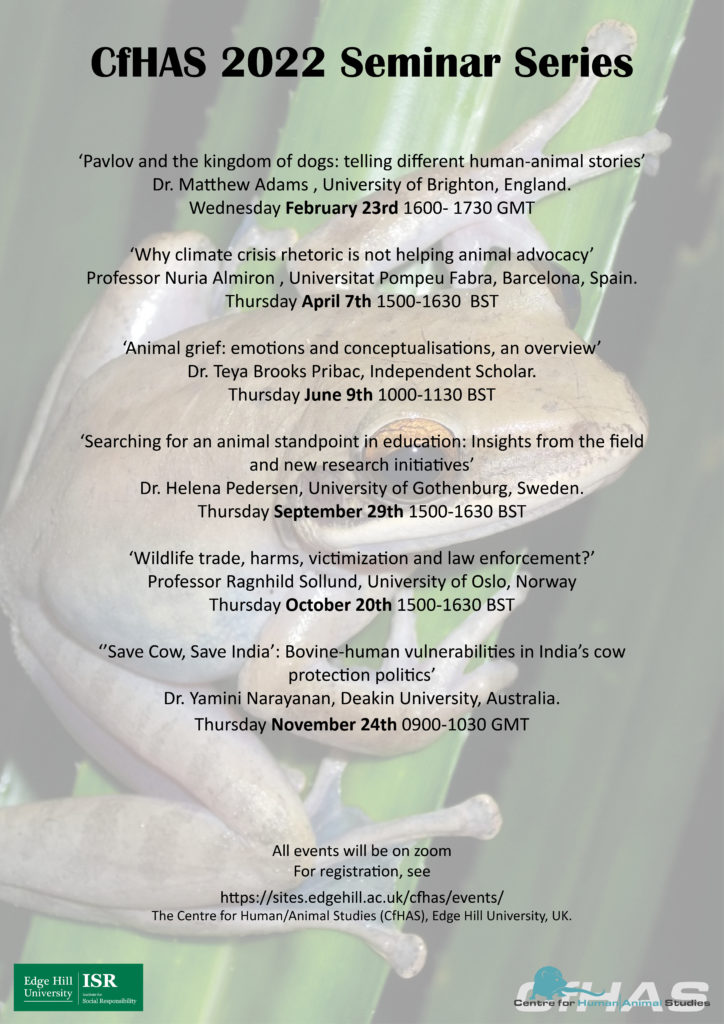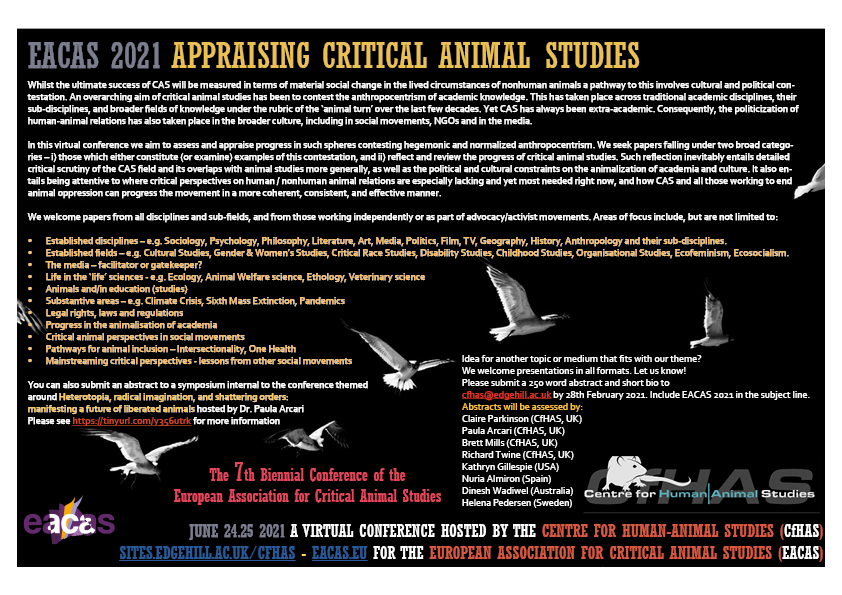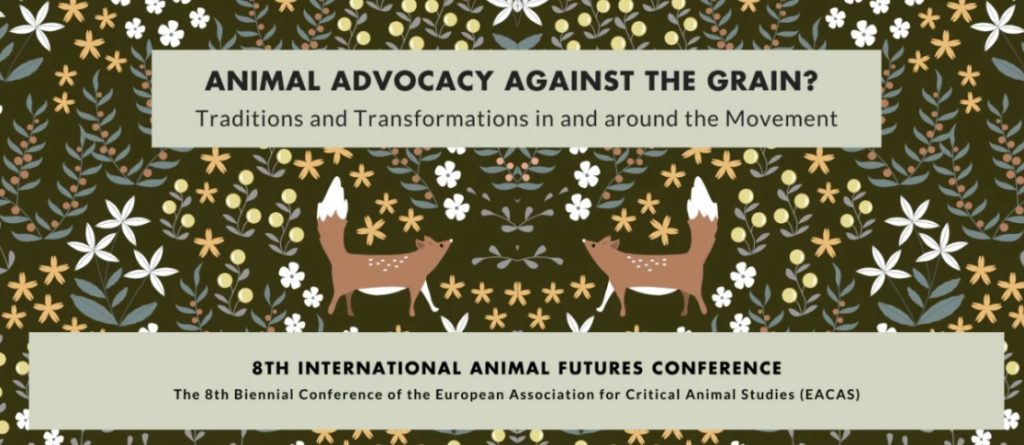
Archives
9th EACAS Conference (2-4th May 2025 Berlin)
**Link to the recordings of talks coming soon**
EACAS Conference on Actioning Change Through Education: Transforming Human-Animal Relations in Times of Crisis, Berlin, Germany
📅 Date: May 2 – May 4, 2025
📍 Location: House of Democracy and Human Rights, Greifswalder Straße 4, 10405 Berlin
The 2025 EACAS Conference will explore meaningful improvements in human-animal relationships, emphasizing practical solutions over theoretical discourse.
Conference Schedule
Friday, May 2, 2025
12:45 PM – Registration
1:30 PM – Welcome by Kathrin Herrmann and Richard Twine
Session 1: Critical Thinking and Empathy (2:00 – 4:00 PM)
Moderator: Richard Twine
- Bruno Ćurko – Fostering Critical Thinking and Bioethical Sensibility Towards Animals in Children
- Benjamin Hunt – Performing Change: The Role of Creative Practices in Cultivating Interspecies Empathy and Action
- Dimitra Kountaki – Fostering Empathy Beyond Anthropocentrism: The Role of Education in Transforming Human-Animal Relations
- Carlo Salzani – Can a Book Make You Vegan?: The Literary Imagination and the Limits of Empathy
☕ Coffee Break
Session 2: Activism, Representation, Participation (4:30 – 6:30 PM)
Moderator: Kathrin Herrmann
- Anne van Veen – De-mooo-cracy: Transformative Learning for Interspecies Democracy
- Tim Reysoo – The Missing Piece: Building an Effective Political and Economic Strategy for the Animal Movement
- Marie Leth-Espensen – Forging Alliances While Crafting Alternative Food Futures: A Study of Activism and Civic Engagement Across the Animal, Environmental, and Rural Movements in Denmark
- Melvin Geib Caballero – Ways Towards Effective Animal Representation
🎉 6:30 – 9:30 PM | Social Gathering & Vegan Potluck (bring your favorite dish and drinks to share)
Saturday, May 3, 2025
Session 1: Media, Public Sphere, and the Arts (9:30 – 11:30 AM)
Moderator: Jonna Håkansson
- Laura Fernández Aguilera, Tuğçe Atacı – Towards Feminist Animal and Media Studies: A Digital Ethnographic Research of Female Hunters on Instagram
- Arshia Batra – Becoming-inanimate, Becoming-human, Becoming-animal: The Objectification and (de)Familiarization of Captive Animals in Photography
- Stefanie Aehnelt – Can Theatre Change the World? What Impact Can Theatre and Art Events Have on Social Change?
- Maria Martelli – The School of Earth and Water: A Multispecies Speculation About Education
☕ Coffee Break
Session 2: Teaching Tools and Education Methods (12:00 PM – 2:00 PM)
Moderator: Kathrin Herrmann
- Monique Janssens – Developing a Global Education Hub for Animal-Free Methods
- Claudia Alonso-Recarte – A Case Study on Animal Advocacy Documentary Films as Educational Tools
- Zipporah Weisberg – Exposing Students to Graphic Images of Violence against Animals: A Helpful or Harmful Pedagogical Strategy?
- Judith Benz-Schwarzburg – Animal Ethics in Picture Books
🍽️ Lunch Break
Session 3: Critical Animal Rights Education I (3:00 – 4:30 PM)
Moderator: Belinda Grimm
- Iana Fishova – Educating Beyond Speciesism: Thinking-Doing Creative-Relational Inquiry in Critical Animal Pedagogies and Vegan Education
- Josip Guć – Appreciating Non-Human Animals by Becoming a Child
- Carolin Eirich – Learning to Be Affected: Principles and Strategies of (In-)Visibility Regarding the Use of Pictures in (Critical) Education on Animal Factories in Germany
☕ Coffee Break
Session 4: Critical Animal Rights Education II (5:00 – 6:00 PM)
Moderator: Belinda Grimm
- Jonna Kallaste Håkansson – Addressing Animal Production in Schools Through the Perspective of Interspecies Sustainability and Justice
- Sarah Wilson – Promoting Non-Human Animal Advocacy in UK Universities in Times of Crisis: Perspectives on the Role of Law Schools in Creating Narratives of ‘Animal Justice’ as ‘Social Justice’
🍽️ 7:00 PM | Group Dinner
Sunday, May 4, 2025
Session 1: Contesting Education (10:00 – 11:30 AM)
Moderator: Liam Bryden
- Tereza Vandrovcová, Zdeněk Joukl – Unpacking Bias Against Meat Alternatives
- Richard Twine – A Child’s Right to Contest Meat Culture – Generational Universalism as a Multiple Injustice
- Kadri Aavik – Vegan Parents Contesting the Anthropocentric Education System: Experiences, Coping Strategies, and Visions of Change
☕ Coffee Break
Session 2: Intersections (12:00 PM – 2:00 PM)
Moderator: Carolin Eirich
- Cameron Dunnett – Vegan Ecomasculinities & Animal Advocacy: The Role of Education in Transforming (Hu)Man-Animal Relationships
- Özlem Güçlü – Feminist Pedagogy for a Non-Anthropocentric Course, Class, and Communitas
- Nóra Ugron, Maria Martelli – “A Communion of Worlds” – Vegan Anarchist Visions in Speculative Fiction & Queer Ecological Poetry from Romania
- Valerie Tollhopf – Fostering Trans and Animal Solidarity: Enhancing Trans* New Materialism via a Marxist Account of Animal Oppression
🍽️ Lunch Break
Session 3: Sanctuary (3:00 – 4:00 PM)
Moderator: Kathrin Herrmann
- Renata Mliczak – The Educational Role of Vegan Farmed Animal Sanctuaries in Nurturing Just Relationships Between Human and Non-Human Animals
- Simone Scampoli – Animal Sanctuaries: The Future We Imagine
Closing Remarks by Kathrin Herrmann (4:00 PM – 4:10 PM)
📩 Questions?
Contact us at kherrma1@jhu.edu

Call for Papers and Sessions! The 9th Biennial Conference of the European Association for Critical Animal Studies (EACAS), Berlin, Germany 2-4 May 2025
Call for Session Proposals and Abstracts: EACAS Conference 2025 in Berlin, Germany
Deadline: January 31, 2025
The European Association for Critical Animal Studies (EACAS) invites session proposals and abstracts for the upcoming conference, “Actioning Change Through Education: Transforming Human-Animal Relations in Times of Crisis”, to be held in Berlin, Germany from May 2–4, 2025.
The conference will explore meaningful improvements to human-animal relationships with a focus on practical solutions.
Key questions include:
– What role can education play in fostering just relationships between humans and other animals?
– What societal shifts are required for an ethical and sustainable coexistence with nonhuman animals?
– How do we connect different struggles for social justice by addressing how deeply intertwined the well-being of humans, nonhumans and our shared planet is?
– What kind of policy changes and practices are best suited to increase public awareness of the interdependence of human, animal and planetary health?
This conference emphasizes actionable approaches over theoretical discussions. Proposals offering hands-on insights, concrete strategies, and real-world examples are especially encouraged. Bridging academia and practice is essential to driving lasting change.
Possible Topics Include:
– Public education on animal justice and environmental sustainability
– Policy and legal frameworks to protect animals and ecosystems
– The role of media and culture in shaping perceptions of nonhuman animals
– Strategies for promoting plant-based diets and addressing animal exploitation
– Cultivating empathy and raising awareness of interconnectedness with nature
We invite scholars, activists, educators, policymakers, practitioners, and artists to submit proposals focusing on actionable ideas and tangible outcomes.
Submission Guidelines
Session Proposals:
Submit a session proposal (maximum 500 words) along with a brief biography of each session chair to Dr. Kathrin Herrmann, Email: kherrma1@jhu.edu. Sessions are 120 minutes, with formats such as four 20-minute presentations followed by a 10-minute discussion or a panel format.
Abstracts:
Submit an abstract (maximum 300 words) for a 20-minute paper to kherrma1@jhu.edu. Include a separate document with your name, email, institution, and short biography.
Deadline: January 31, 2025.
Decisions will be communicated in mid-February 2025.
Further details on registration will follow.
For more information, please contact: kherrma1@jhu.edu
Thank you!
Thanks to everyone who presented or attended the joint EACAS/Animal Futures conference. Many thanks also to our Estonian hosts. As soon as the talks are available online we well let you know here. Now start thinking about Berlin in 2025!
Welcome delegates!
We would love it if delegates to the joint EACAS/Animal Futures Conference this week could make a donation to any of these good causes:
- Estonian Vegan Society: https://vegan.ee/tegutse/toeta/
- Loomus: https://loomus.ee/toeta/
- The latest Vegan Land Movement Campaign: https://globalvegancrowdfunder.org/vegan-land-movement-animal-agriculture-land-buyout-2/
- Freshfields Animal Rescue: https://www.nowdonate.com/checkout/x6me81w4x35b9h4v8d5d
- Institute for Animal Happiness microsanctuary: http://www.instituteforanimalhappiness.com/donate-1
- Hugletts Wood Farm Animal Sanctuary: https://www.paypal.com/paypalme/huglettswood?fbclid=IwAR2S58El5tHo4_gPZIbBX01mkHImhxiAwLMQYSqzODvV1dbeUjAYtsBK-jw
Thank you and enjoy the conference!
One month to go – The 8th Biennial Conference of the European Association for Critical Animal Studies (EACAS) & 8th International animal futures conference. 16-18 June 2023. Please click the image below for the schedule.
Annual Meeting of the International Association of Vegan Sociologist
Title: Vegan Intersectionality
Call for Paper Deadline: June 1, 2023
Date: October 7 & 8 2023
Location: Online
Schedule: TBD
Mainstream theories of social inequality frequently compartmentalize experiences, but inequality rarely works that way in real life. Instead, individuals are comprised of many different identities at once, and these identities will interact with one another in unique ways. Furthermore, multiple systems and institutions are simultaneously at work in a given society. This schema is known as intersectionality, and it is a concept that emerges out of Black feminist thought.
In animal studies, vegan scholars employ this framework to argue that one’s life chances will be shaped, not just by one’s race, class, or gender, but also by their species. Vegan scholars also recognize the influence of an additional system….human supremacy. Historical constructions of race, class, gender, and other identities shape how animals are thought about and how they are treated. Sociologists interested in human justice, meanwhile, would benefit from recognizing how human oppression is always shaped by processes of species inequality.
Given that species, class, race, gender, and other identity categories are all historically constructed using similar mechanisms (such as animalization, objectification, sexualization, depersonalization, denaming, and so on), it is important to apply an intersectional perspective to achieve a more accurate understanding of oppression for nonhuman animals and humans alike. In the fourth annual meeting of the International Association of Vegan Sociologists, we take on this important task, one that is fundamental to vegan sociological theory.

Submission Guidelines
The 2023 IAVS annual meeting will showcase research related to veganism, animal rights, and theories of intersectionality. We welcome submissions for individual presentations (15 minutes and an additional 5 for questions) or panels (45 minutes with 15 for questions) to be delivered in an online format.
Please note that all submissions should fall within the guidelines of the International Association of Vegan Sociologists. We are only accepting sociological submissions; submissions that lack a clear sociological focus will not be included. To that end, all submissions must include a one or two sentence rationale clarifying how the submission aligns with sociological theory or practice.
This online conference, organised by the International Association of Vegan Sociologists will be held online and will accommodate North American, European, and Australian time zones. Proposals and queries should be sent to info@vegansociology.com by 1st June. It is expected that all potential presenters have familiarised themselves with the principles of IAVS and plan their presentations with these in mind.
Proposal Checklist:
- Name
- Affiliation (if any)
- Preferred email
- Title of talk
- Abstract (50-300 words)
- Sociological relevance (1-2 sentences)
More info: https://www.vegansociology.com/conference/
Call for Papers – EACAS 8th Conference / Animal Futures 8th Conference
2022 Events of the Centre for Human Animal Studies
CfHAS has organised a seminar series for the year, all on zoom for your convenience. Please see the line-up, and how to register for the first talk, here https://sites.edgehill.ac.uk/cfhas/events/

Videos from 7th EACAS Conference (2021)
We are pleased to inform you that all the presentations from the conference Appraising Critical Animal Studies (7th EACAS Conference) which took place online on 24 and 25 June 2021 are now available to view on YouTube or below:

Day 1 (Thursday 24 June 2021)
09:30 – 11:00 PANEL 1 (The Covid-19 Context)
- One [is the] Problem with ‘One Health’: Anthropocentrism as a Barrier to Achieving Multi-Species Global Health in Light of COVID-19 (Donelle Gadenne)
- Absent Agents: Re-Assembling Human-Animal Relations in the Context of Covid-19 (Lena Schlegel)
- Covid as a Reckoning for Animal Advocacy: Addressing the Illegitimacy of Critical Animal Perspectives and Laying the Groundwork for Future ‘Pivotal Moments’ (Paula Arcari)
09:30 – 11:00 PANEL 2 (Activists and Activism)
- (De)Colonizing Turtle Island: Indigenous Veganism and Gender Activism (Denisa Krásná)
- Story, Strategy and Social Movement Organising (Esther Salomon)
- Using Visual Modes of Communication to Contest Normalized Anthropocentrism: An Analysis of Animal Activist Campaigns in Australia (Jane Mummery and Debbie Rodan)
09:30 – 11:00 PANEL 3 (Education and Pedagogy 1)
- CAS, Literature, and the Teachable Moment (Claudia Alonso-Recarte)
- Framing Possums: Observations of Conservation Education in Aotearoa New Zealand and the Potential for Compassionate Conservation (Emily Major)
- Building Effective Alliances: Towards an Educational Reform for Interspecies Sustainability (Maria Helena Saari)
11:30 – 13:00 PANEL 1 (Animal Human Relations)
- Animals for AI – AI for Animals (Leonie Bossert)
- Contesting Human Exceptionalism in Design Research (Michelle Westerlaken and Erik Sandelin)
- Thinking and Feeling with the Animal Archive: A Material-Semiotic Approach for Critical Animal Studies (Seth Josephson)
11:30 – 13:00 PANEL 2 – NOT RECORDED (Exploring De-Colonization / De-Domestication for Animal Liberation)
- De-Domestication Through Human Capacitation (Dorna Behdadi)
- Exploring Spaces of De-Domestication in Education (Helena Pedersen)
- The Concept of De-Domestication Through a Diffractive Reading of Decolonial Theory and Feminist New Materialism (Jonna Håkansson)
11:30 – 13:00 PANEL 3 (Knowledges)
- I Am Vegan, But I Wear Leather: A Systematic Review on Definitions of Veganism Term (Estela Díaz, Gelareh Salehi and Raquel Redondo)
- Challenging Anthropocentrism in Continental Philosophy through Animal Resistance (Lukas Leitinger)
- Animal Intimacies and Animal Liberation: Differences and Challenges in Cross-Disciplinary Work (Stephanie Eccles and Darren Chang)
14:00 – 15:00 PANEL 1 (Animals and Organisations)
- CAS and Media: Critique, Pragmatism and Advocacy (Claire Parkinson)
- Saving Animals or Saving Face? An Analysis of Animal Rights and Tourism Industry Partnerships in Promoting Ethical Animal Tourism (Jes Hooper and Carol Kline)
- A Promising Start: The Case of Critical Animal Studies in Turkey (Sezen Ergin Zengin)
14:00 – 15:00 PANEL 2 (Discourse)
- Where the Animal is Loud but CAS is Silent: A Critical Analysis of Entrenched Anthropocentrism across Contemporary Food Justice Discourse (Abi Masefield)
- NOT RECORDED: On Copies and Originals: Unpacking the Discourse of Naturalness of Animal Products (Kadri Aavik and Kuura Irni)
- NOT RECORDED: Discursive Representation of Pigs, Chickens and Cows in the Digital Edition of the Newspaper El Nuevo Día (Michelle Guzmán Rivero)
14:00 – 15:00 PANEL 3 (Art)
- Resistance Within the Museum Fauna: An Online Live Performance (EvaMarie Lindahl)
- Art After the Animal Turn (Jessica Ullrich)
- Urban Wolves in France: Literary and Artistic Zoopolis of Olivia Rosenthal and Stéphane Thidet (Paulina Szymonek)
16:00 – 17:30 PANEL 1 (Animals and/in Law)
- Animal Personhood: The Quest for Recognition (Macarena Montes Franceschini)
- NOT RECORDED Centering Animality in Law and Liberation: A Multidimensional Liberation Theory for the Zoological Revolution (Paulina Siemieniec)
- Police Brutality and the Nonhuman in the United States (Thomas Aiello)
16:00 – 17:30 PANEL 2 (Representation and Aesthetics 1)
- Who is Sallie Gardner?: Towards a Multispecies Media Studies (Brett Mills)
- Humanimal Poetics: Femininity, Animality and Pathology at the Species Border (Jessica Holmes)
- To Represent a Cow (Kristina Meiton)
16:00 – 17:30 PANEL 3 (Sociology 1)
- Animals and Society: Through the Lens of the Holy Trinity (Jennifer Rebecca Schauer and Madeleine Palmer)
- The Future of Feminist Sociology is Animal (Katja M. Guenther)
- Where are the Nonhuman Animals in the Sociology of Climate Change? (Richard Twine)
17:30 -17:45 Round-up and Poetry by Grdon Meade
20:00 – 22:00 Roundtable on CAS and Education
Featuring Dinesh Wadiwel, Vasile Stanescu & Helena Pedersen
Day 2 (Friday 25 June 2021)
09:30 – 11:00 PANEL 1 (Representation and Aesthetics 2)
- Representation, Form, Politics: What Next for Literary Animal Studies? (Dominic O’Key)
- A Critical Review of Music for Animals (Martin Ullrich)
- Animation, Animal Rights, and Social Change: Initiating Conversations on Why Animals Matter (Rajlakshmi Kanjilal)
09:30 – 11:00 PANEL 2 (Food)
- Could Yoga be a Promising Pathway for Animal Inclusion? (Jenny Mace)
- The ‘Ethically’ Consumable: Frames, Knowledge Production and Power Relations Surrounding ‘Food Animals’ in the Swedish Organic Sector (Josefin Velander)
- “I Am More than Just Food!”: What Human-Eating Monsters Can Teach Us at the Intersection of CAS and Literary Studies (Xiana Vázquez Bouzó)
09:30 – 11:00 PANEL 3 (Sociology 2)
- Readings of Marx in Critical Animal Studies: Appraising Traditions and New Directions (Chiara Stefanoni)
- Animal Appearances in Sociology: Observations on Animals in Sociological Texts from the 19th until 21st Century (Salla Tuomivaara)
- Addressing Ethical Bias of Professionals Using Animals (Tereza Vandrovcová)
11:30 – 13:00 PANEL 1 (Power)
- Towards a Holistic View of Power: Human and Non-Human Power (Michal Rotem)
- Beyond Intersectionality, Towards Interconstitutionality (Pablo Pérez Castelló)
- Bare Life Laid Bare: Human Sovereignty and Animal Abjection in the Context of the Global Coronavirus Pandemic (Zipporah Weisberg)
11:30 – 13:00 PANEL 2 (Representation and Aesthetics 3)
- Canine Tooth: Human-Canine Vulnerability and Aggression in Amores Perros (2000), Wendy & Lucy (2008) and Los Reyes (2019) (Borbála László)
- A Literary Analysis from the Perspective of the Horse in Anna Sewell’s Black Beauty: The Autobiography of a Horse (Elisabeth Kynaston)
- Animal Aesthetics and Animal Ethics: Exploring Connections (Marta Tafalla)
11:30 – 13:00 PANEL 3 (Heterotopia 1: Sites, Spaces, and Practices of ‘Undoing’)
- Vegan Vloggers’ Narratives: Heterotopias for Ending the Commodification of Animals? (David Felipe Martín García and Estela Díaz)
- Family as Sanctuary, Sanctuary as Community: Two Models of Multispecies Relations for Nonhuman Animal Liberation (Maria Martelli)
- Re-Making Domestic Natures: Multispecies Life and Care at the Sanctuary (Marie Leth-Espensen)
14:00 – 15:00 PANEL 1 (Ethics)
- Expressions of Animal Ethics: Animal Sanctuaries, the Case of Spain (Alberto José Franco-Barrera and Joaquín Fernández-Mateo)
- Animal Rights, Justice, and the Future of Food (Josh Milburn)
- Until Every Cage is Empty: Animal Liberation, Prison Abolition, and The Wages of Humanness (Vasile Stănescu)
14:00 – 15:00 PANEL 2 (Gender and Feminism)
- Middle Eastern Women’s Attitudes and Perceived Barriers of Becoming Vegan and Publicly Maintaining their Lifestyle Decisions (Gelareh Salehi and Estela Díaz)
- Animals in His-Story: How Animal Exploitation Shaped the Oppression of Men (Laura Schleifer)
- The Complicated Sex Lives of Endangered Species: Gendered Rhetoric of Giant Panda Reproduction in Captive Breeding Programs, 1985-2020 (Meg Perret)
14:00 – 15:00 PANEL 3 (Heterotopia 2: Imagining Liberated Animal Futures)
- Animal Agency, Animal Resistance (Todd C. Simmons)
- “But, What Would Happen to the Veterinary Profession?”: A Radical Imagining of the Contemporary Western Veterinary Profession Post-Animal Liberation (Donelle Gadenne)
- NOT RECORDED: What if Francis Power Cobbe Had Won?: Looking to the Past to Actualize a Future Beyond Experiments (Mitch Goldsmith)
16:00 – 17:30 PANEL 1 (Education and Pedagogy 2)
- Nonspeciesist Rhetorical Theory and Pedagogy: A Programmatic Agenda (Cristina Hanganu-Bresch)
- Teaching as Activism: Dismantling Speciesism in the Humanities Classroom (Elizabeth Tavella)
- Friends of the Jaguar: Discussing Interspecies Ethics and Post-Anthropocentric Perspectives with Children from a Brazilian Public School (Mariah Peixoto, Tânia Regina Vizachri, Luís Paulo de Carvalho and Adriana Regina Braga)
16:00 – 17:30 PANEL 2 (Representation & Aesthetics 4)
- The Interwar Period United States’ Guide Dog Movement as Enhancing and Complicating Understandings of the Human-Animal Bond: Researching and Analyzing a Case Study Representing an Intersection of Critical Animal Studies and Critical Disability Studies (Eric Deutsch)
- The Representation of Animal Activists in US Animal Advocacy Documentaries (Núria Almiron, Laura Fernández and Olatz Aranceta-Reboredo)
- Mixed Media Messages: Representation of Nonhuman Animals on Children’s TV (Lynda M. Korimboccus)
16:00 – 17:30 PANEL 3 (Heterotopia 3: Pathways to Liberated Animal Futures)
- I Couldn’t Lie Anymore So I Started to Call my Dog God (Alexandra Isfahani–Hammond)
- NOT RECORDED: Bully Goes Fishing: Prefigurative Prototyping in Ahuman Design (Erik Sandelin)
Source: Youtube Channel of the Centre for Human-Animal Studies (CfHAS)

